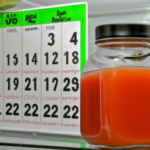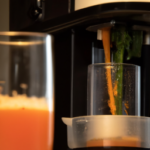Juice Tips and Tricks
How Long Does A Fresh Juice Last
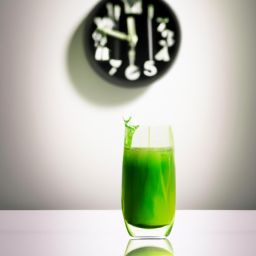
As a fan of fresh juice, I often ponder the issue of how long it can last before it goes bad. There are different opinions on this matter – some recommend drinking it right away, while others say it can still be good for up to a week.
So, I decided to do some research to get to the bottom of this debate and find out the truth about how long fresh juice can actually last.
There are several factors that can affect the shelf life of fresh juice, including the type of fruit or vegetable used, the juicing method, and the storage conditions. While some types of juice may last longer than others, all fresh juice is susceptible to oxidation, which can cause it to spoil quickly.
In this article, we’ll explore how oxidation affects the shelf life of fresh juice, as well as some tips for extending its shelf life and storing it safely.
Key Takeaways
- The shelf life of fresh juice is affected by temperature, air exposure, type of fruit/vegetable used, and oxidation.
- Preventing oxidation can be achieved by adding antioxidants, drinking juice soon after juicing, adding lemon juice, and storing in an airtight container in the fridge.
- Signs of spoilage include sour/off smell, mold, changes in color, and slightly fizzy texture.
- Safety considerations for making fresh juice include washing produce thoroughly, using clean equipment and surfaces, consuming juice immediately after making it, and being aware of bacteria growth as a major factor.
Factors That Affect the Shelf Life of Fresh Juice
Hey, did you know that the shelf life of your fresh juice can be affected by factors like temperature, air exposure, and the type of fruit or vegetable you use? All of these factors can significantly impact the freshness of your juice, and it’s important to understand how they work to ensure that you’re getting the most out of your drink.
One of the most significant factors affecting freshness is temperature. When you expose your juice to high temperatures, it can break down faster, which can lead to a loss in nutrients and flavor.
Additionally, air exposure is another factor that can impact freshness. When your juice is exposed to air, it can oxidize, which can lead to a change in color, flavor, and texture.
Despite these factors, the benefits of consuming fresh juice are numerous, and understanding how to properly store your juice can help you get the most out of your drink.
Understanding oxidation and how it impacts the shelf life of your juice is crucial, so let’s take a closer look.
Understanding Oxidation
Imagine you’ve just cut open a ripe apple and left it on the counter, slowly watching it turn brown – that’s oxidation, and it’s the same process that affects your freshly made juice over time.
When juice is exposed to air, the oxygen in the air reacts with the juice’s natural enzymes, causing it to break down and lose its nutritional value. The longer your juice is exposed to air, the more oxidation occurs, and the quicker it will spoil.
Preventing oxidation is key to extending the shelf life of your fresh juice. One way to do this is by adding antioxidants to your juice. Antioxidants are compounds that help to neutralize free radicals, which are unstable molecules that can cause damage to cells and contribute to aging and disease.
Some fruits and vegetables that are high in antioxidants include berries, citrus fruits, leafy greens, and carrots. Adding these ingredients to your juice can help to slow down the oxidation process and keep your juice fresher for longer.
To further extend the shelf life of your fresh juice, there are other tips and tricks to follow.
Tips for Extending the Shelf Life of Fresh Juice
If you want to keep your juice detox or weight loss plan going strong, you’ll need to take some extra care when storing your juice. The first and most important step is to drink your juice as soon as possible after juicing. Fresh juice is highly perishable and will begin to oxidize as soon as it comes into contact with air. This is why you shouldn’t make more juice than you can drink in one sitting.
To extend the shelf life of your fresh juice, you can add a little bit of lemon juice to the mixture. The citric acid in the lemon juice helps to slow down the oxidation process, keeping your juice fresher for longer. You can also store your juice in an airtight container in the refrigerator. This will help to slow down the oxidation process and keep your juice fresh for up to three days.
However, if you want your juice to taste its very best, it’s always best to drink it as soon as possible after juicing. With these tips in mind, let’s move on to how to store fresh juice.
How to Store Fresh Juice
When it comes to storing fresh juice, there are a few key considerations to keep in mind. First, you’ll want to decide whether to keep your juice in the fridge or the freezer.
Next, you’ll need to choose the right type of container – glass or plastic – to ensure optimal freshness. Finally, there are some best practices you can follow to make sure your juice stays as fresh as possible for as long as possible.
Let’s take a closer look at each of these factors.
Fridge vs Freezer
You can extend the shelf life of your fresh juice by storing it in the fridge or freezer. Both options have their pros and cons, depending on your priorities and needs. Here are some factors to consider when deciding whether to keep your juice in the fridge or freezer:
-
Optimal temperature for storing fresh juice: The ideal temperature range for storing fresh juice is between 32°F and 40°F. This is the temperature range of a typical refrigerator, which makes it a convenient option for most people. However, if you want to keep your juice for longer than a few days, you may want to consider freezing it.
-
Fridge vs freezer: Storing your juice in the fridge will keep it fresh for up to 3 days. This means that you can make a large batch of juice and enjoy it throughout the week. However, if you don’t plan on drinking your juice within a few days, you may want to freeze it. Frozen juice can last up to 6 months, which means you can stock up and have juice on hand whenever you want it.
-
Pros and cons of fridge storage: One advantage of storing your juice in the fridge is that it’s convenient and accessible. You can easily pour yourself a glass of juice whenever you want it. However, fridge storage can take up valuable space, especially if you’re making large batches of juice.
-
Pros and cons of freezer storage: Freezing your juice is a great way to extend its shelf life and ensure that you always have juice on hand. However, it can be time-consuming to thaw the juice when you want to drink it. Additionally, freezing can alter the texture and taste of the juice, so it may not be the best option if you’re very particular about the quality of your juice.
When it comes to storing fresh juice, the container you use is just as important as the storage method. Glass and plastic containers each have their own advantages and disadvantages, which we’ll explore in the next section.
Glass vs Plastic Containers
Glass and plastic containers offer different benefits and drawbacks for storing your favorite juices. Glass containers are known for their durability and ability to keep the juice fresh for longer periods of time. They are also non-reactive, so they won’t alter the flavor of your juice. However, glass containers can be heavy and breakable, making them less convenient for on-the-go lifestyles.
On the other hand, plastic containers are lightweight and shatterproof, making them ideal for those who need to take their juice on the go. However, plastic can be more porous than glass, allowing air and bacteria to enter the container and potentially spoil the juice faster. Additionally, plastic containers can be less durable and may need to be replaced more frequently. When it comes to the environmental impact, glass is more easily recyclable and less harmful to the environment than plastic.
In order to ensure the longest shelf life for your fresh juice, it is important to choose the right container for your needs and to follow best practices for storing.
Best Practices for Storing
To maximize the shelf life of your favorite juices, it’s essential to store them properly and adhere to recommended guidelines. First, it’s important to keep your juice refrigerated at all times, ideally at a temperature of 40°F or below. This will help slow down the growth of any harmful bacteria that may lead to spoilage.
Additionally, you should always keep your juice in an airtight container, whether it’s glass or plastic. Exposure to air can cause your juice to oxidize, leading to a loss of flavor and nutrients. Finally, try to consume your juice within 3-4 days of opening the container to ensure its freshness.
By following these guidelines for juice storage, you’ll be able to preserve the quality and flavor of your favorite drinks for as long as possible. As important as it is to store your juice properly, it’s also crucial to know the signs of spoilage.
In the next section, we’ll discuss how to identify when your juice has gone bad and when it’s time to throw it out.
Signs of Spoilage
If the fresh juice has a sour or off smell, it may be an indication of spoilage. Other signs of spoilage include mold, changes in color, and a slightly fizzy texture.
It’s important to remember that fresh juice is highly perishable and can easily spoil if not stored properly. To prevent spoilage, it’s important to store the juice in an airtight container in the refrigerator, away from direct sunlight and heat.
Common mistakes in storing fresh juice include leaving it at room temperature for too long, not using an airtight container, and storing it in a warm or humid environment. Furthermore, it’s important to consume the fresh juice within 24-48 hours of making it.
Drinking spoiled juice can lead to foodborne illness and can be dangerous for individuals with weakened immune systems. Safety considerations when consuming fresh juice include washing produce thoroughly before juicing, using clean equipment and surfaces, and consuming the juice immediately after making it.
Taking these precautions can ensure that the juice is safe to consume and will provide the maximum health benefits.
Safety Considerations
As I continue to explore the topic of fresh juice, it’s important to discuss safety considerations.
One of the main concerns is the growth of bacteria in fresh juice. This can lead to foodborne illness if proper precautions aren’t taken, such as refrigeration and consumption within a certain time frame.
Another safety measure is pasteurization. It’s a process of heating the juice to kill harmful bacteria, which can extend the shelf life of the juice.
Bacteria Growth
You may be surprised to learn that bacteria growth is a major factor in determining how long your fresh juice will last. For example, if you leave your juice out on the counter for too long, the bacteria in the air can quickly start to multiply and spoil your drink.
Here are some key factors to consider when it comes to bacteria growth and fresh juice:
-
Impact of temperature on bacteria growth: Bacteria thrive in warm temperatures, which means that the warmer your juice is, the more quickly bacteria will multiply. This is why it’s important to store your fresh juice in the fridge as soon as possible after making it.
-
Common bacteria found in fresh juice: There are several types of bacteria that can grow in fresh juice, including E. coli, Listeria, and Salmonella. These bacteria can cause food poisoning and other illnesses, which is why it’s crucial to handle your juice properly.
-
Juice acidity: The acidity of your juice can also impact bacteria growth. If your juice has a high acidity level, it will be less hospitable to bacteria and may last longer.
-
Shelf life of pasteurized vs. unpasteurized juice: Pasteurized juice has been treated to kill bacteria, which means it has a longer shelf life than unpasteurized juice. Unpasteurized juice should be consumed within a few days to reduce the risk of bacterial growth.
Understanding the impact of bacteria growth on fresh juice can help you make informed decisions about how to store and consume your juice. Speaking of which, let’s talk about pasteurization and how it can help to prolong the shelf life of your juice.
Pasteurization
Pasteurization is a process that heats juice to a specific temperature, killing bacteria and increasing its shelf life. This process involves heating the juice to at least 70°C for a few seconds and then rapidly cooling it down. It is often used in the juice industry to extend the shelf life of juices, especially those that are sold in stores and supermarkets.
Another method that is gaining popularity is high pressure processing (HPP), which uses high pressure to kill bacteria and increase the shelf life of juice. This method does not involve heating the juice and is therefore considered a raw juice processing method. However, it is important to note that while pasteurization and HPP can increase the shelf life of juice, they may also reduce some of the raw juice benefits. In the next section, I will discuss the nutritional content of fresh juice.
Nutritional Content of Fresh Juice
Wow, the nutritional punch packed in a glass of freshly squeezed juice is mind-blowing! As someone who loves to juice, I’m constantly amazed at the benefits it offers.
Here are four reasons why juicing is an excellent way to get your daily dose of nutrients:
-
Juicing helps reduce inflammation: Fresh juices are high in antioxidants, which help reduce inflammation in the body. This is particularly important for those who suffer from chronic illnesses such as arthritis or autoimmune diseases.
-
Juicing can improve digestion: Fresh juices are rich in enzymes that aid in digestion. This can help alleviate symptoms of indigestion and constipation.
-
Juicing can boost your immune system: Fresh juices are packed with vitamins and minerals that help to strengthen your immune system. This can help prevent illnesses and keep you feeling healthy.
-
Juicing can help manage specific health conditions: Certain fruits and vegetables have been shown to have specific health benefits. For example, drinking beet juice has been shown to help lower blood pressure, while ginger juice can alleviate nausea.
As we move on to discussing the best time to drink fresh juice, it’s important to keep in mind the many benefits that juicing can offer. Drinking fresh juice regularly can help you maintain good health and manage specific health conditions.
Best Time to Drink Fresh Juice
Optimizing the benefits of fresh juice consumption can depend on timing, so it’s important to consider the best time to drink your juice. While it’s generally recommended to drink fresh juice on an empty stomach, the benefits of morning consumption are particularly noteworthy.
Drinking fresh juice first thing in the morning can help boost your metabolism, increase your energy levels, and improve digestion. This is because your body is in an ideal state to absorb the nutrients from the juice when your stomach is empty.
Additionally, the impact of meal timing on juice absorption should also be taken into account. Drinking fresh juice right before or after a meal can hinder your body’s ability to absorb the nutrients as effectively. This is because the digestive enzymes and juices produced during digestion can interfere with the absorption of the nutrients from the juice.
Therefore, it’s best to wait at least an hour after a meal before consuming fresh juice, or to drink it first thing in the morning on an empty stomach for optimal benefits.
As we’ve seen, the best time to drink fresh juice is on an empty stomach, preferably first thing in the morning. By doing so, you can reap the most benefits from the nutrients in the juice.
In the next section, we’ll take a look at some popular fresh juice recipes to help you get started on your juicing journey.
Popular Fresh Juice Recipes
Looking for some delicious and healthy options to try out? You’ll love these popular fresh juice recipes that are not only tasty but also packed with essential nutrients.
Juicing has become increasingly popular as it’s an easy way to incorporate more fruits and vegetables into your diet. To make the most out of your fresh juice, it’s important to use proper juicing techniques, such as using a masticating juicer to retain more nutrients and antioxidants.
One of the most popular fresh juice recipes is the classic green juice. It typically includes kale, spinach, cucumber, celery, lemon, and ginger. This juice is packed with vitamins A, C, K, and minerals such as iron, calcium, and potassium.
Another delicious and healthy option is the carrot, apple, and ginger juice. This juice is rich in vitamin C and beta-carotene, which are both great for boosting your immune system and improving skin health.
By incorporating fresh juice into your diet, you can reap numerous health benefits and improve your overall well-being.
Frequently Asked Questions
What are the benefits of drinking fresh juice?
Drinking fresh juice can provide numerous benefits such as supporting a juice cleanse, providing essential nutrients, and acting as immune boosters. Scientific evidence supports the consumption of fresh juice as part of a healthy diet.
Can you freeze fresh juice to extend its shelf life?
Freezing juice can extend its shelf life but may decrease its nutritional value. The freezing process can cause cell damage, leading to a loss of nutrients. It is best to consume fresh juice for maximum nutrition.
How often should you drink fresh juice?
Drinking fresh juice daily has numerous benefits, such as improving digestion and providing essential vitamins and minerals. However, drawbacks include excess sugar and lack of fiber. It is recommended to consume fresh juice in moderation as part of a balanced diet.
What types of fruits and vegetables are best for making fresh juice?
Juice recipes that contain fruits and vegetables with high nutritional value are best for making fresh juice. For example, kale is like a nutritional powerhouse. Experiment with different combos to find what works for you.
How can you tell if the fresh juice has gone bad?
To ensure freshness, store fresh juice in a tightly sealed container in the refrigerator for up to 72 hours. Signs of spoiled fresh juice include a sour smell, mold growth, or a change in color or texture.
Conclusion
Well, it seems that the answer to the question of how long fresh juice lasts is not straightforward. Many factors come into play, such as the type of juice, the method of extraction, and the storage conditions.
However, there are some general guidelines that can help you extend the shelf life of your fresh juice. It’s essential to understand the process of oxidation and take measures to slow it down. You can also use various storage techniques, such as refrigeration and vacuum sealing, to preserve the freshness of your juice.
By following these tips, you can enjoy your fresh juice for longer and get the most out of its nutritional benefits. So, go ahead and experiment with different recipes and make sure to store your juice correctly to enjoy it at its best.
Susannah expertise lies in researching and compiling evidence-based content on juicing, nutrition, and overall health. She is committed to ensuring that The Juicery World offers accurate, up-to-date, and trustworthy information to empower readers to take control of their health. Susannah’s goal is to inspire individuals to embrace juicing as a way to nourish their bodies and live their best lives.
Juice Tips and Tricks
How to Make Aloe Vera Juice Taste Better

Tired of the strong flavor of aloe vera juice? No problem, we’ve got the answer for you.
In this article, we’ll share some tips and tricks to make your aloe vera juice taste better. We have tried and tested various methods to enhance the flavor without compromising the health benefits.
From choosing the right juice to adding natural sweeteners and infusing with fruits and herbs, we’ve got all the information you need to transform your aloe vera juice into a delightful and refreshing beverage.
Let’s dive in!
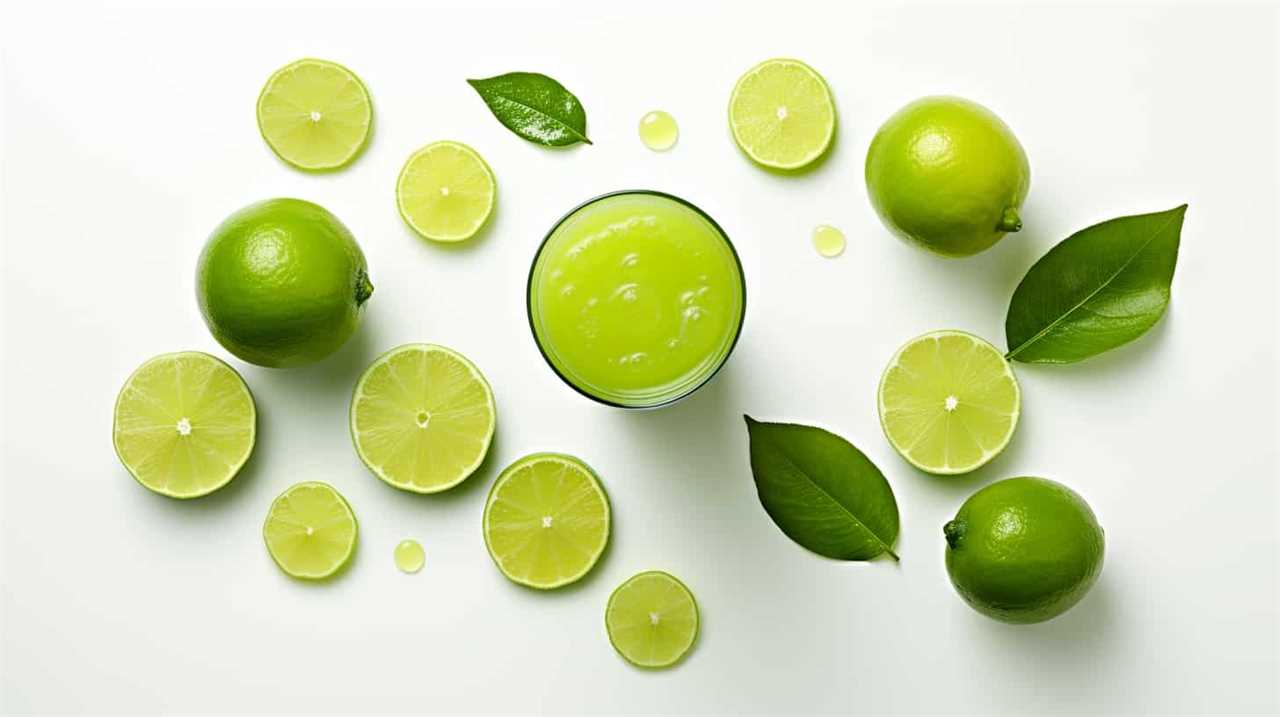
Key Takeaways
- Choose a reputable brand of aloe vera juice that prioritizes quality and uses organic, pure aloe vera.
- Avoid brands that contain added sugars or artificial ingredients.
- Use natural sweeteners like honey, agave syrup, or stevia to enhance the taste of aloe vera juice.
- Experiment with adding fruits, herbs, and other juices to create unique flavor combinations and enhance the health benefits of aloe vera juice.
Choosing the Right Aloe Vera Juice
We can enhance our experience with aloe vera juice by selecting the right brand and type for our preferences. When it comes to finding a reputable brand, it’s important to do some research and read reviews from other consumers. Look for brands that prioritize quality and use organic, pure aloe vera without any added sugars or artificial ingredients. Understanding the health benefits of aloe vera juice is also crucial in making the right choice. Aloe vera is known for its soothing properties, aiding digestion, promoting skin health, and boosting the immune system. By choosing a high-quality brand, we can ensure that we’re getting the maximum benefits from our aloe vera juice.
Now that we know how to choose the right brand, let’s move on to the next step of adding natural sweeteners.
Adding Natural Sweeteners
To enhance the flavor of our aloe vera juice, we can add natural sweeteners such as honey or agave syrup. Using alternative sweeteners not only adds sweetness but also brings unique flavors to the juice. Here are some options to consider:
- Stevia: A natural sweetener derived from the Stevia plant, it’s a zero-calorie alternative to sugar.
- Maple Syrup: This natural sweetener adds a rich and earthy flavor to the aloe vera juice.
- Dates: Pureed dates can be used to sweeten the juice while also providing essential nutrients like fiber.
In addition to using alternative sweeteners, we can enhance the flavor of aloe vera juice by adding spices and extracts. Cinnamon, ginger, or vanilla extract can add warmth and depth to the taste. By experimenting with different combinations of these natural sweeteners, spices, and extracts, we can create a flavor profile that suits our preferences.
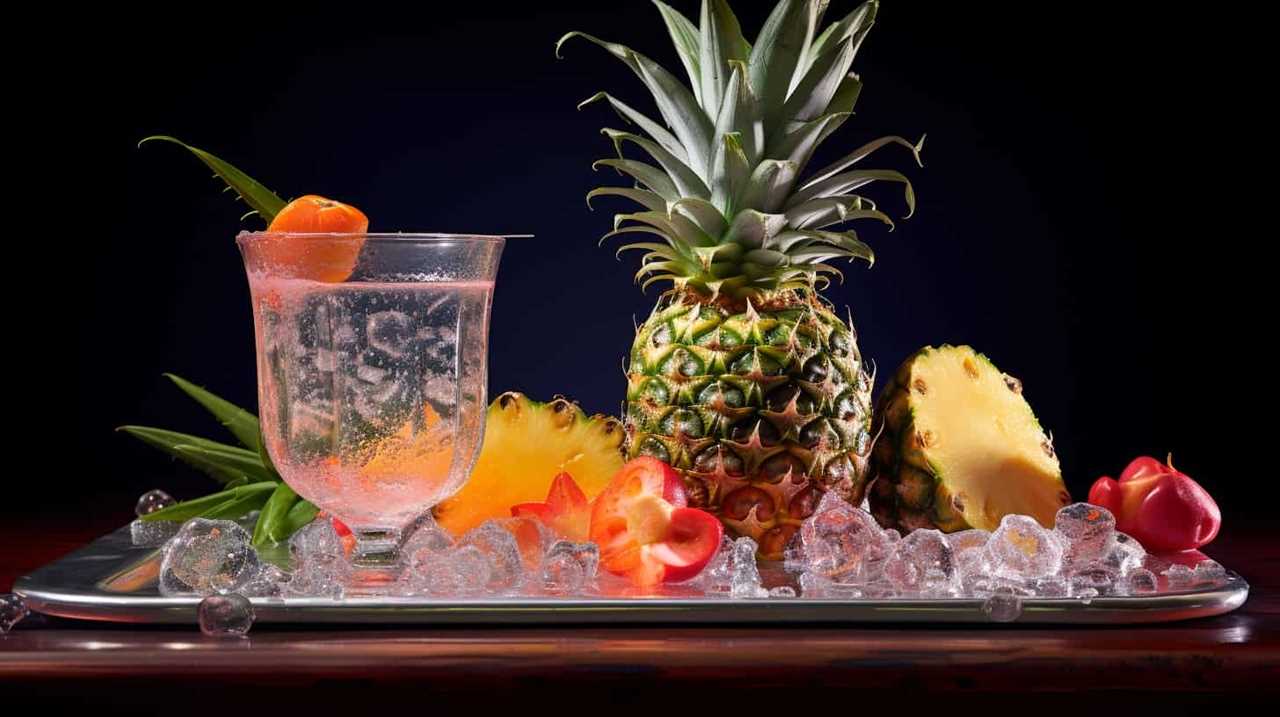
Now, let’s move on to the next section and learn how to infuse aloe vera juice with fruits and herbs to further enhance its taste.
Infusing With Fruits and Herbs
As we explore ways to make our aloe vera juice taste better, one option to consider is infusing it with fruits and herbs. Creating unique aloe vera blends by adding fruits and herbs not only enhances the flavor but also adds a touch of freshness and complexity to the juice.
Fruits like strawberries, pineapple, or citrus can add a burst of sweetness, while herbs like mint, basil, or ginger can provide a subtle yet refreshing twist. Exploring the benefits of herbal infusions can also be beneficial for our health. For example, adding a few sprigs of lavender can promote relaxation and reduce stress. Additionally, infusing aloe vera juice with rosemary can aid digestion and boost the immune system.
Blending With Other Juices
Let’s try mixing aloe vera juice with different fruit juices to create delicious and refreshing blends. Blending aloe vera juice with other fruits not only enhances its taste but also adds nutritional benefits to your drink. Here are three fruit juices that you can mix with aloe vera juice:

- Orange juice: Combining aloe vera juice with orange juice not only adds a tangy flavor but also boosts your intake of vitamin C, which is essential for a strong immune system.
- Pineapple juice: Mixing aloe vera juice with pineapple juice creates a tropical blend that isn’t only refreshing but also helps in digestion. Pineapple contains bromelain, an enzyme that aids in breaking down proteins and promoting better digestion.
- Watermelon juice: Blending aloe vera juice with watermelon juice creates a hydrating and refreshing combination. Watermelon is rich in water content and contains electrolytes that can help replenish your body’s fluids.
Experimenting With Flavor Combinations
While we can try various flavor combinations with aloe vera juice, it’s important to find the right balance to enhance its taste. Experimenting with different flavors can’t only make the juice more enjoyable but also enhance its health benefits.
Aloe vera juice is known for its numerous health benefits, such as boosting digestion, promoting hydration, and supporting the immune system. By adding complementary flavors, we can create a refreshing summer drink that not only tastes great but also provides a nutritional boost.
Some popular flavor combinations include mixing aloe vera juice with citrus fruits like lemon or orange, adding a splash of coconut water for a tropical twist, or combining it with cucumber and mint for a refreshing and cooling effect.
Don’t be afraid to get creative and find the flavor combination that suits your taste buds best!
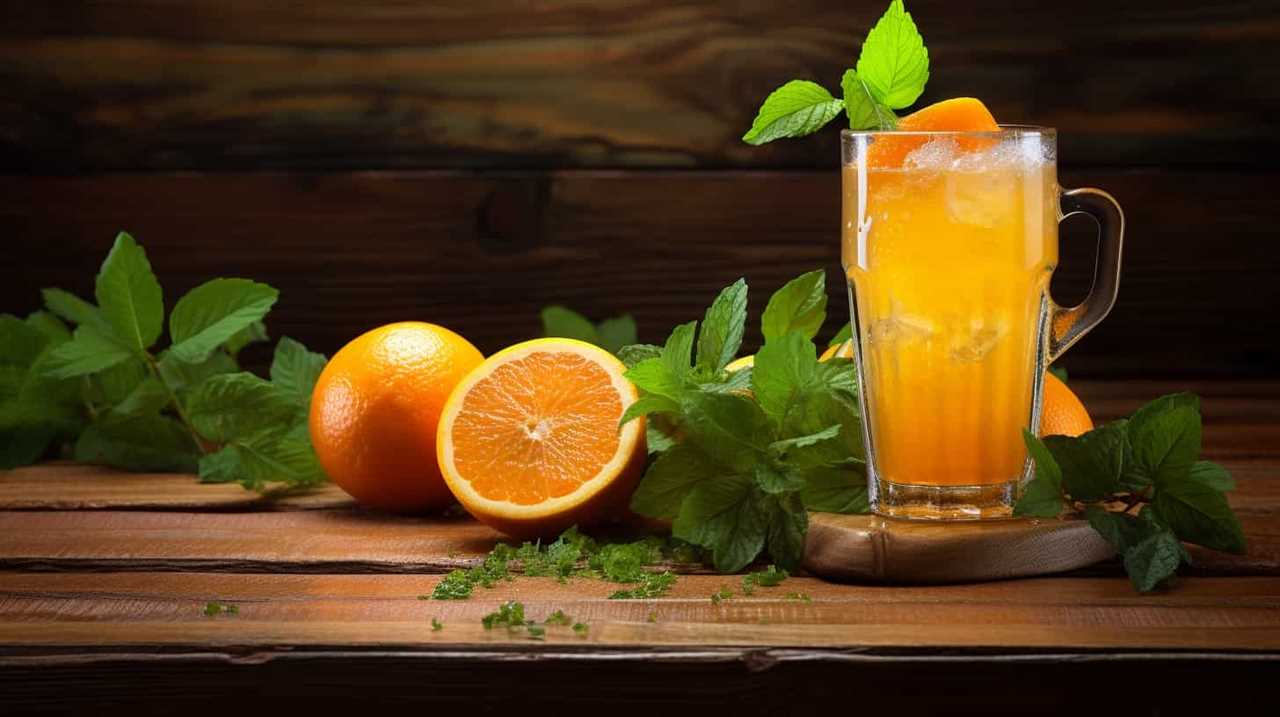
Frequently Asked Questions
Can I Use Store-Bought Aloe Vera Gel Instead of Fresh Aloe Vera for Making Juice?
Yes, you can use store-bought aloe vera gel instead of fresh aloe vera for making juice. However, it’s important to note that fresh aloe vera juice may have more health benefits due to its higher nutrient content.
How Long Can I Store Aloe Vera Juice in the Refrigerator?
Aloe vera juice can be stored in the refrigerator for up to a week. Refrigeration helps maintain the longevity and freshness of the juice, preserving its beneficial properties.
Can Aloe Vera Juice Help With Digestive Issues?
Aloe vera juice can potentially help with digestive issues when taken in appropriate dosages. However, it is important to note that there may be potential side effects. It is always best to consult with a healthcare professional before starting any new supplement regimen.
Can I Use Artificial Sweeteners Instead of Natural Sweeteners in My Aloe Vera Juice?
Using artificial sweeteners in aloe vera juice may affect its taste and potential health benefits. However, natural sweeteners like honey or stevia can enhance the flavor without compromising its nutritional value.

Is It Safe to Drink Aloe Vera Juice Every Day?
Drinking aloe vera juice daily can have numerous benefits, such as improving digestion and boosting the immune system. However, consuming it regularly may also lead to potential side effects like diarrhea or stomach cramps.
Conclusion
In conclusion, making aloe vera juice taste better is easy and enjoyable.
By choosing the right aloe vera juice and adding natural sweeteners, infusing with fruits and herbs, blending with other juices, and experimenting with flavor combinations, you can create a delightful and refreshing drink.
So go ahead and unleash your creativity in the kitchen, and transform your aloe vera juice into a sensational elixir that will transport your taste buds to paradise.
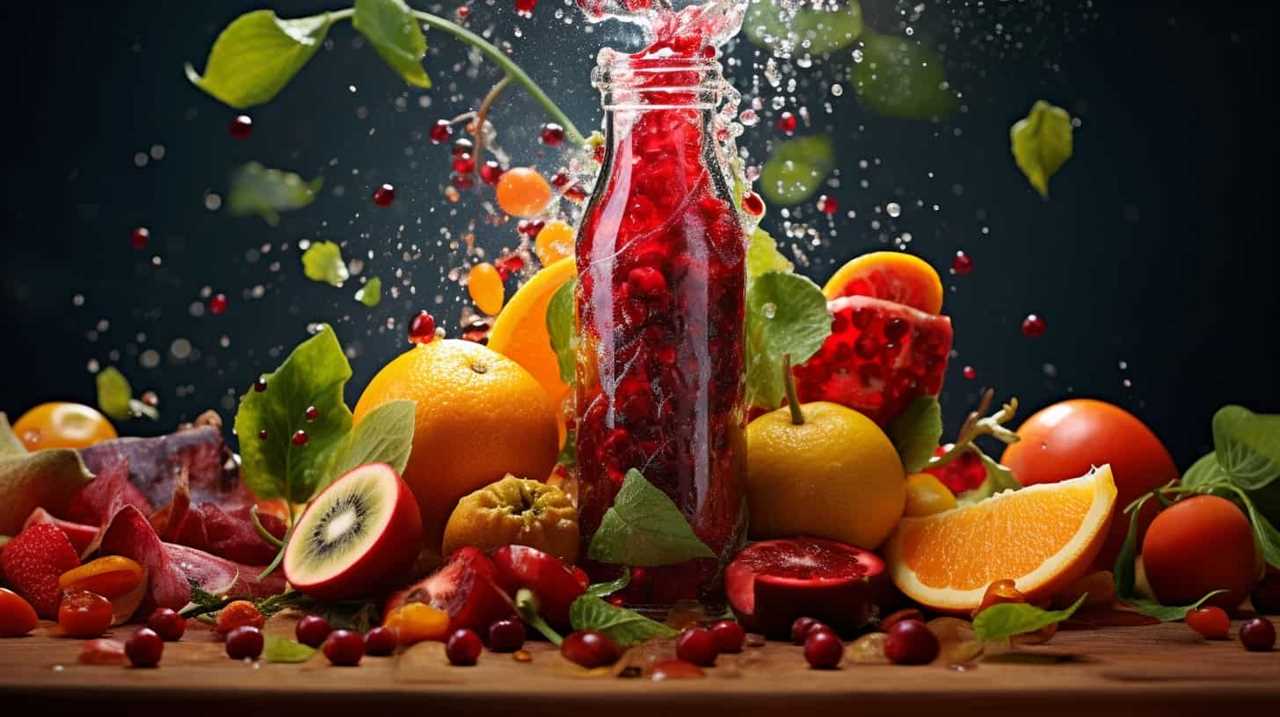
Susannah expertise lies in researching and compiling evidence-based content on juicing, nutrition, and overall health. She is committed to ensuring that The Juicery World offers accurate, up-to-date, and trustworthy information to empower readers to take control of their health. Susannah’s goal is to inspire individuals to embrace juicing as a way to nourish their bodies and live their best lives.
Juice Tips and Tricks
How to Make a Glass of Lemonade With Bottled Lemon Juice
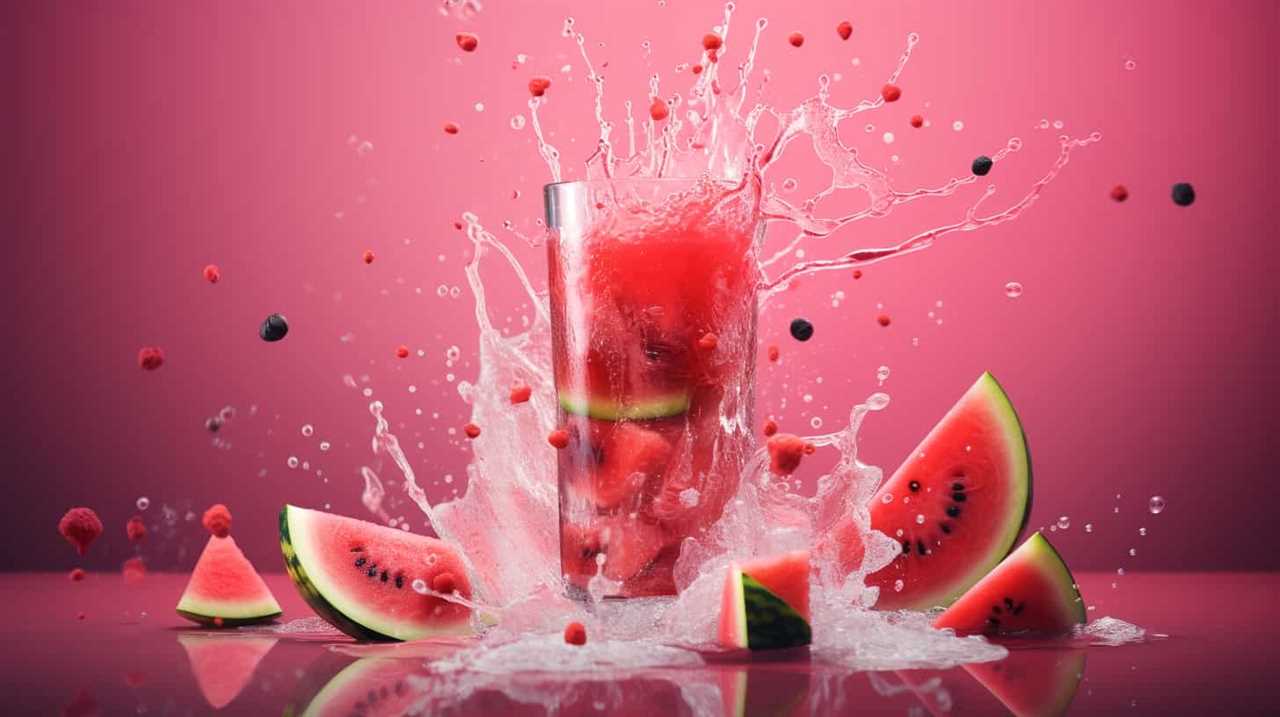
Are you craving a cool glass of lemonade to quench your thirst? Look no further! Try out our perfect recipe using bottled lemon juice that will surely please your taste buds.
In this article, we’ll guide you through the process of creating a tangy and sweet concoction that will leave you feeling refreshed and satisfied.
So grab your ingredients and let’s get started on this delightful journey of serving ourselves and others a glass of pure lemony goodness.
Key Takeaways
- Consider the storage of the bottled lemon juice (dark glass or plastic bottles, protect from light exposure, check expiration date)
- Choose a suitable pitcher and fresh lemons for enhanced flavor
- Store the lemonade concentrate in the refrigerator to maintain freshness
- Adjust the sweetness and tartness to taste with sugar or more lemon juice, and experiment with different sweeteners or additional flavors.
Choosing the Right Bottled Lemon Juice
What are the key factors we should consider when selecting the right bottled lemon juice for our lemonade?

One important factor is how the lemon juice is stored. Look for bottles that are made of dark glass or plastic, as they help protect the juice from light exposure, which can degrade its quality. It’s also important to check the expiration date to ensure freshness.
Another benefit of using bottled lemon juice is convenience. It saves time and effort compared to squeezing fresh lemons. Additionally, bottled lemon juice provides consistent flavor, as the acidity levels are standardized.
When selecting a brand, consider reading reviews and checking for certifications, such as organic or non-GMO.
Gathering the Necessary Ingredients and Tools
How can we gather all the necessary ingredients and tools to make a glass of lemonade with bottled lemon juice?
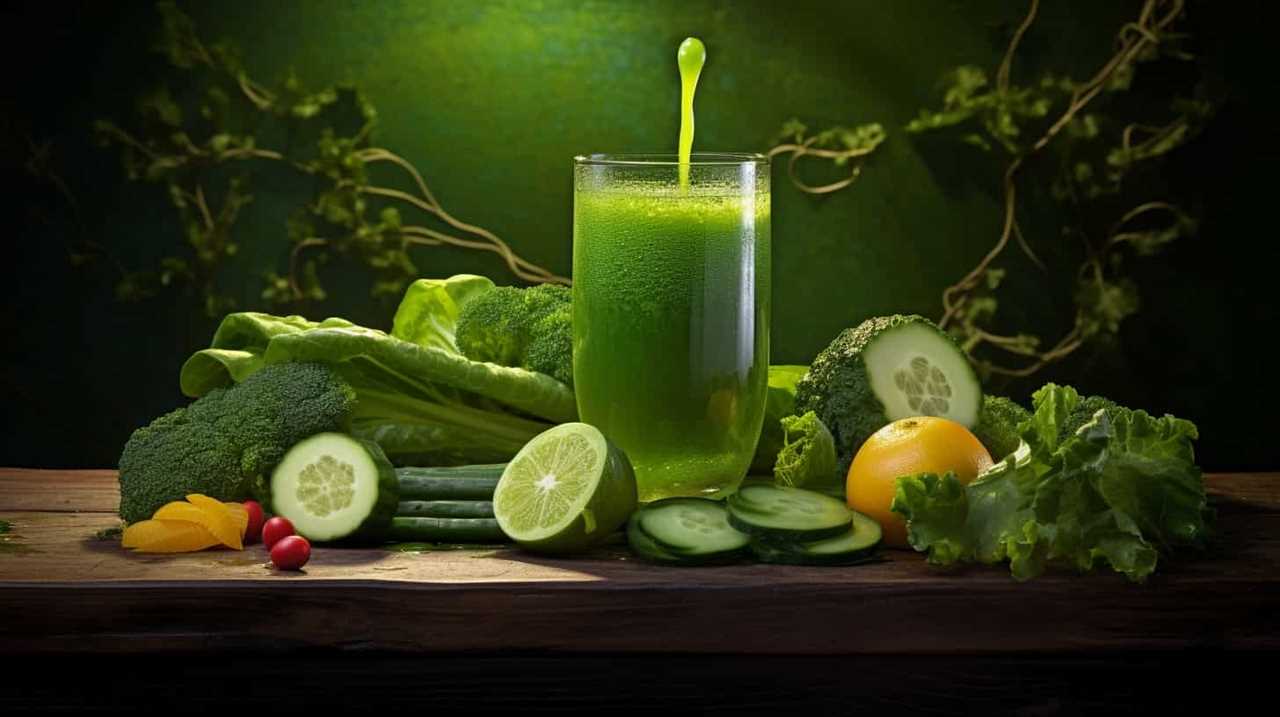
It’s important to start with the right pitcher. Look for a pitcher that’s made of glass or BPA-free plastic, as these materials won’t affect the taste of the lemonade. The pitcher should also have a lid or cover to keep the lemonade fresh and prevent spills.
Now, let’s talk about the lemons. While bottled lemon juice is convenient, using fresh lemons instead can elevate the flavor of your lemonade. Choose lemons that are firm and have a bright yellow color. Give them a gentle squeeze to ensure they’re juicy. To extract the juice, you’ll need a citrus juicer or a reamer. These tools make it easy to get every last drop of juice from the lemons.
Mixing the Lemonade Concentrate
To start mixing the lemonade concentrate, we’ll slowly pour the bottled lemon juice into the pitcher. It’s important to choose the right container for the lemonade concentrate. A pitcher with a lid or a tightly sealed container will help maintain the freshness and prevent any spills or leaks. Once the lemon juice is in the pitcher, we can move on to the next step of adding water and sweetener.
To ensure the lemonade concentrate stays fresh, it’s essential to store it properly. Keep the pitcher in the refrigerator to maintain its cool temperature and prevent any bacteria growth. If you have any leftover concentrate, transfer it to a smaller container with an airtight lid before refrigerating. This will help retain its flavor and prevent any contamination.
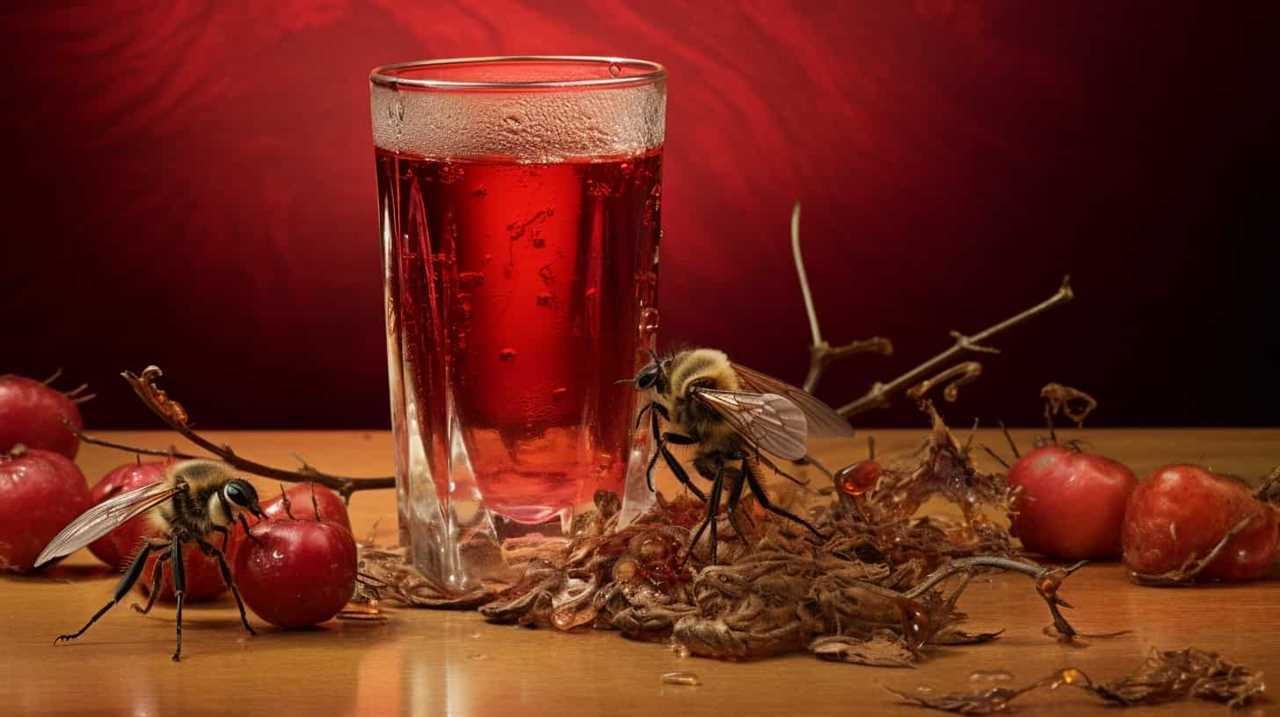
Now that we’ve mixed the lemonade concentrate, it’s time to adjust the sweetness and tartness to taste.
Adjusting the Sweetness and Tartness to Taste
We can adjust the sweetness and tartness of the lemonade to taste by adding more sugar or lemon juice, respectively. If you prefer a sweeter lemonade, simply add more sugar and stir until it dissolves completely. You can experiment with different sweeteners such as honey or agave syrup to find the perfect balance of sweetness.
On the other hand, if you want a tangier lemonade, add more lemon juice gradually, tasting as you go until it reaches your desired level of tartness.
Additionally, you can get creative with your lemonade by adding flavors like fresh mint leaves or a hint of lavender. These additions can elevate the flavor profile and create a more refreshing and unique experience.
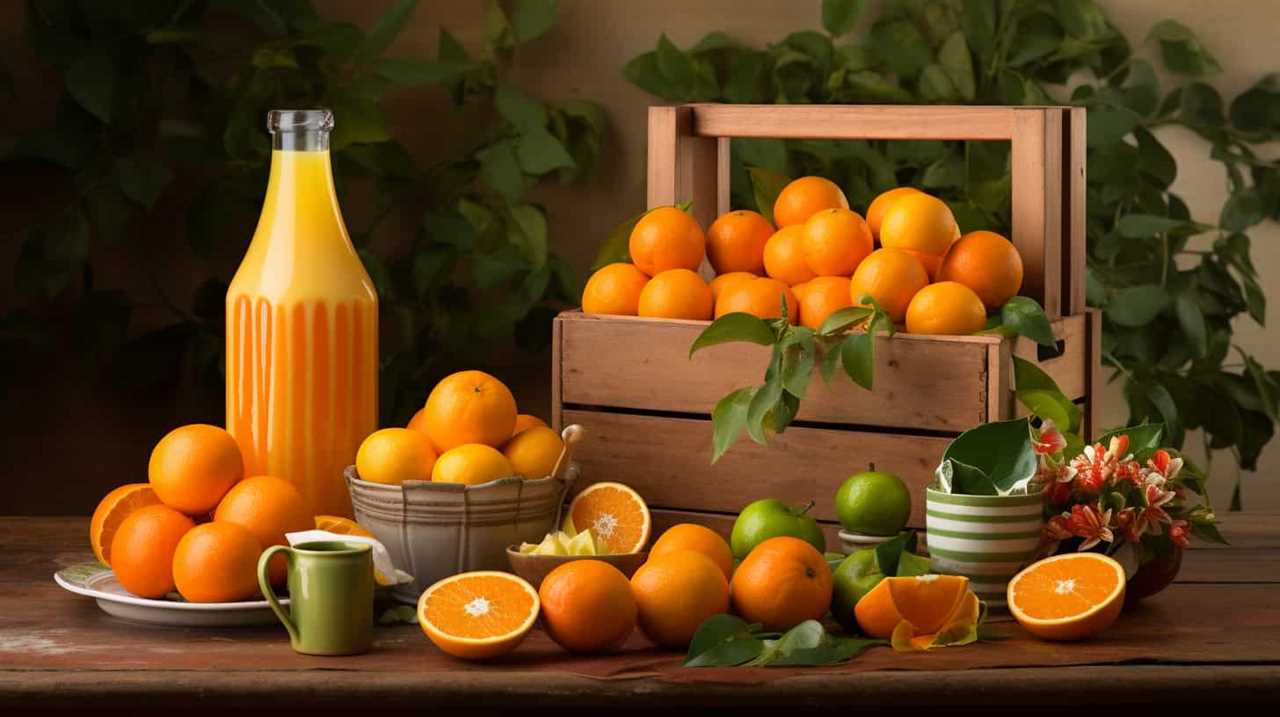
Now that we’ve adjusted the sweetness and tartness of our lemonade, let’s move on to serving and enjoying your refreshing glass of lemonade.
Serving and Enjoying Your Refreshing Glass of Lemonade
Now let’s sit back, relax, and savor our refreshing glass of lemonade.
When it comes to serving and enjoying this delightful drink, there are a few techniques and garnishing options to consider.
Firstly, serving your lemonade chilled is essential for maximum enjoyment. Ensure that you have chilled glasses or add ice cubes to the glasses before pouring the lemonade.

To add a touch of elegance, you can garnish your lemonade with a slice of lemon on the rim of the glass. For an extra burst of flavor, you could also add a sprig of fresh mint or a few berries.
Remember to gently stir the lemonade before serving to evenly distribute the flavors.
Now, take a sip, feel the refreshing tang of lemon, and let the sweet and tart flavors dance on your taste buds.
Cheers!
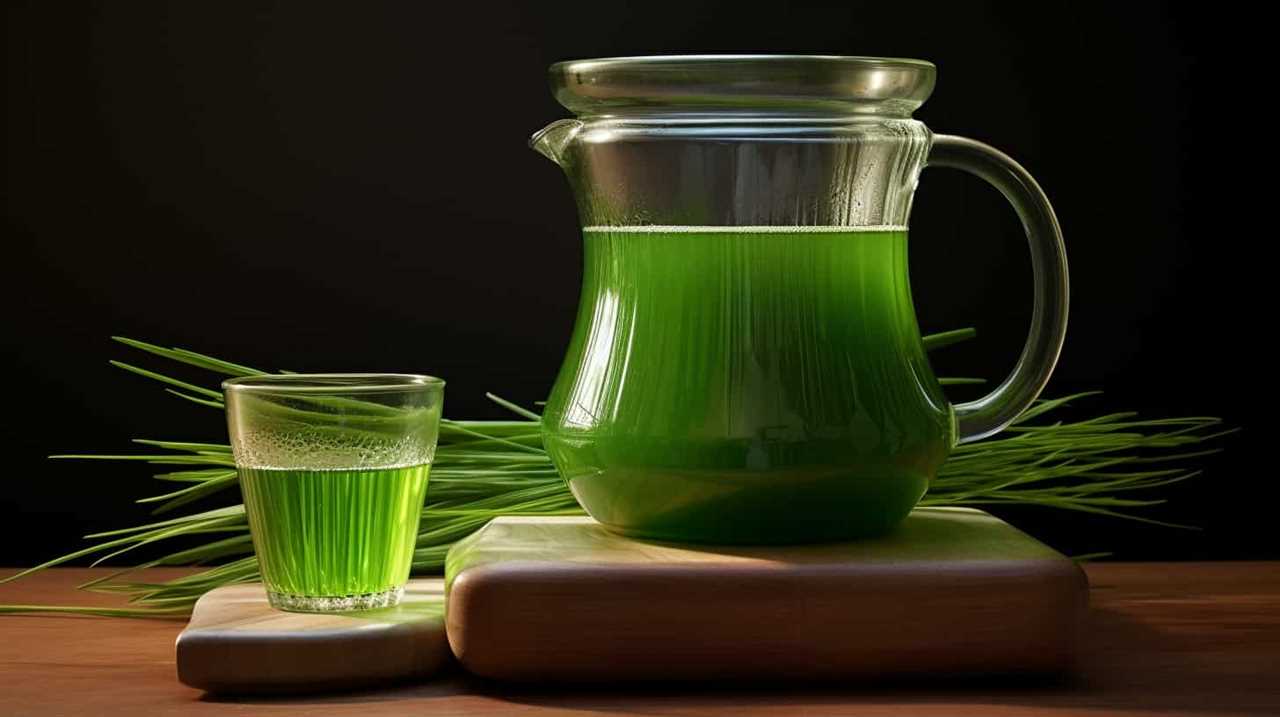
Frequently Asked Questions
Can I Use Fresh Lemons Instead of Bottled Lemon Juice?
Fresh lemons offer numerous benefits over bottled lemon juice. The taste of fresh lemons is unparalleled, providing a vibrant and tangy flavor. Incorporating fresh lemons into your lemonade will elevate its taste and give it a refreshing and authentic twist.
Can I Substitute Sugar With a Different Sweetener?
Substituting sweeteners in lemonade can enhance the flavor and offer health benefits. We’re knowledgeable about alternative sweeteners and can provide precise, detailed instructions on using them in place of sugar.
How Long Does the Lemonade Concentrate Need to Chill in the Refrigerator?
The chilling time for the lemonade concentrate in the refrigerator is typically around 1-2 hours. Using bottled lemon juice offers the benefit of convenience and consistent flavor for a refreshing glass of lemonade.
Can I Add Other Fruits or Flavors to the Lemonade?
Sure, we can definitely add different fruits or flavors to our lemonade. It’s a great way to experiment with unique flavors and create refreshing, personalized drinks. The possibilities are endless!

How Long Does the Lemonade Stay Fresh in the Refrigerator?
Lemonade made with bottled lemon juice can stay fresh in the refrigerator for about 5-7 days. To maximize shelf life, store it in an airtight container and keep it chilled.
Conclusion
And so, with a few simple steps and the right ingredients, a glass of refreshing lemonade is born.
Like a symphony of flavors dancing on your taste buds, this tangy elixir quenches thirst and brings joy on a hot summer day.
Just a sip transports you to a world of citrusy delight, where the sweetness and tartness blend harmoniously.

So go ahead, indulge in the art of lemonade-making and savor every drop of this sun-kissed nectar.
Cheers to the perfect glass of lemonade!
Susannah expertise lies in researching and compiling evidence-based content on juicing, nutrition, and overall health. She is committed to ensuring that The Juicery World offers accurate, up-to-date, and trustworthy information to empower readers to take control of their health. Susannah’s goal is to inspire individuals to embrace juicing as a way to nourish their bodies and live their best lives.
Juice Tips and Tricks
How to Know if Orange Juice Is Bad

We’ve all been in that situation before – reaching for a glass of orange juice and hesitating, unsure if it’s still okay to drink. Fear not! This article will give you the knowledge you need to determine for sure if your orange juice is still fresh or if it’s gone bad.
With a blend of scientific precision and practical tips, we’ll explore color changes, strange smells, off taste, texture changes, and mold or growth that may indicate spoilage.
Let’s dive in and serve ourselves a refreshing glass of certainty!
Key Takeaways
- Color changes in orange juice can indicate a loss of freshness and shelf life extension, but it doesn’t necessarily mean the juice is bad.
- Unusual or off-putting odors in orange juice, such as sour or fermented scents, can be a sign of poor quality.
- An off taste in orange juice, such as sour, bitter, or fermented flavors, suggests that the juice is spoiled.
- Texture changes in orange juice, such as pulp separation or a thicker consistency, can occur as the juice ages, so it’s important to consume it before the expiration date.
Color Changes in Orange Juice
We should be aware that color changes can indicate whether orange juice is bad.
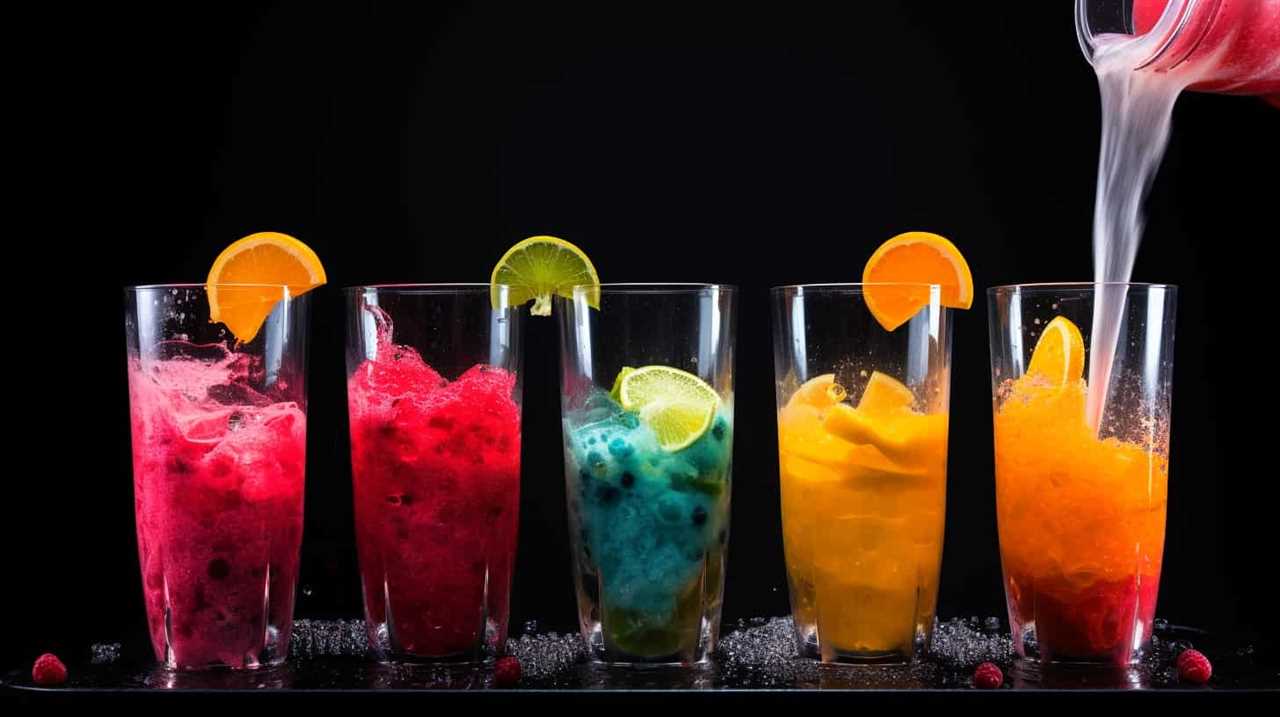
When it comes to orange juice, color is a crucial factor to consider. As oranges are exposed to air, an oxidation process occurs, which leads to changes in color. Fresh orange juice has a vibrant orange hue, indicating its freshness and high nutritional value.
However, as time passes, the juice may undergo a color change, turning dull or brownish. This change in color is a result of the oxidation process, which affects the flavor and quality of the juice. It’s important to note that while a change in color doesn’t necessarily mean the juice is bad, it does indicate that the juice is losing its freshness and shelf life extension.
Therefore, it’s advisable to consume orange juice when it’s at its freshest, as indicated by its vibrant orange color.
Strange Smells in Orange Juice
When it comes to evaluating orange juice, we should be cautious of any strange smells or odors. A fresh, pleasant smell is indicative of good quality orange juice. However, if you notice any unusual or off-putting odors, it may be a sign that the juice has gone bad. These smells can range from a sour or fermented scent to a rancid or moldy aroma.
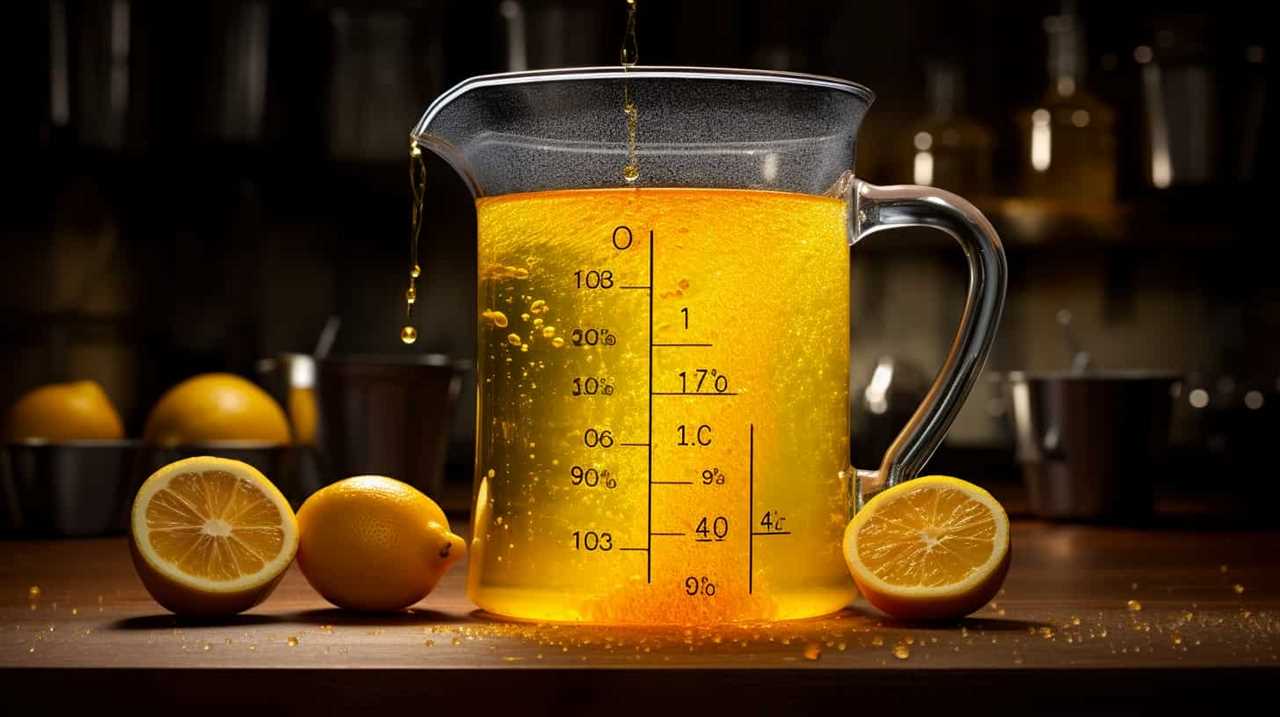
It’s important to note that while some natural variations in scent can occur due to the specific variety of oranges used, any strong or unpleasant smells should raise concerns. If you have citrus fruit allergies, it’s especially important to pay attention to the smell of orange juice, as it could indicate the presence of spoilage or contamination.
Ensuring the quality of orange juice is essential as it’s a popular beverage known for its health benefits, including being rich in vitamin C and antioxidants.
Off Taste of Orange Juice
Our taste buds can detect even the slightest hint of an off taste in orange juice, which can indicate that it has gone bad. The taste of orange juice should be fresh, tangy, and slightly sweet. If it tastes sour, bitter, or fermented, it’s likely spoiled.
One common cause of an off taste in orange juice is the use of overripe oranges. When oranges become overripe, their flavor profile changes, resulting in a less pleasant taste. Another factor to consider is the expiration date. Orange juice that has passed its expiration date is more likely to develop an off taste. It’s important to check the expiration date before consuming orange juice to ensure its freshness and quality.
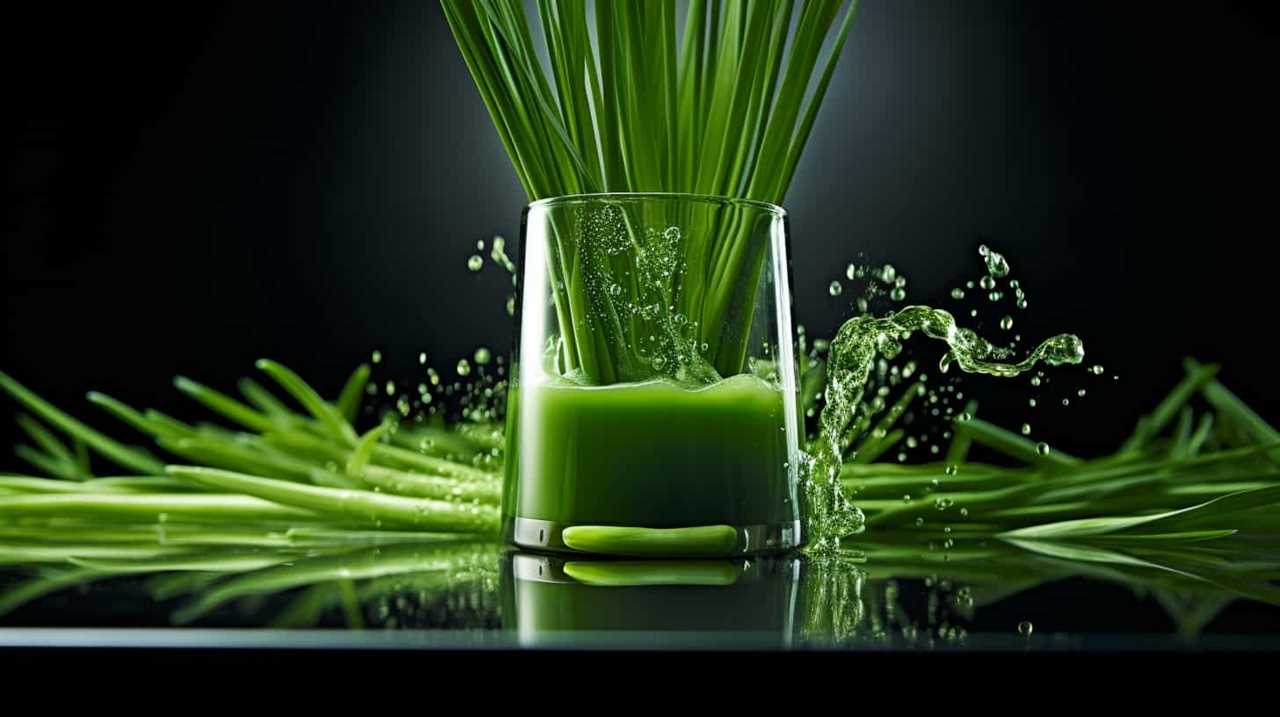
Now, let’s move on to discuss the texture changes in orange juice.
Texture Changes in Orange Juice
As we explore the texture changes in orange juice, it’s important to note that certain factors can cause it to become thicker or develop sediment. One common texture change in orange juice is pulp separation, where the pulp separates from the liquid and settles at the bottom. This can occur naturally over time, as the pulp particles become denser and sink.
Another factor that can affect the texture of orange juice is the expiration date. As orange juice ages, it may start to develop a thicker consistency and even form sediment. This is a result of the natural breakdown of the juice’s components. Therefore, it’s crucial to check the expiration date on orange juice and consume it before it reaches its expiration date to avoid any undesirable texture changes.
Mold or Growth in Orange Juice
We need to be aware of the possibility of mold or other growth occurring in orange juice. Mold can develop in orange juice if it isn’t stored properly or if it has passed its expiration date.
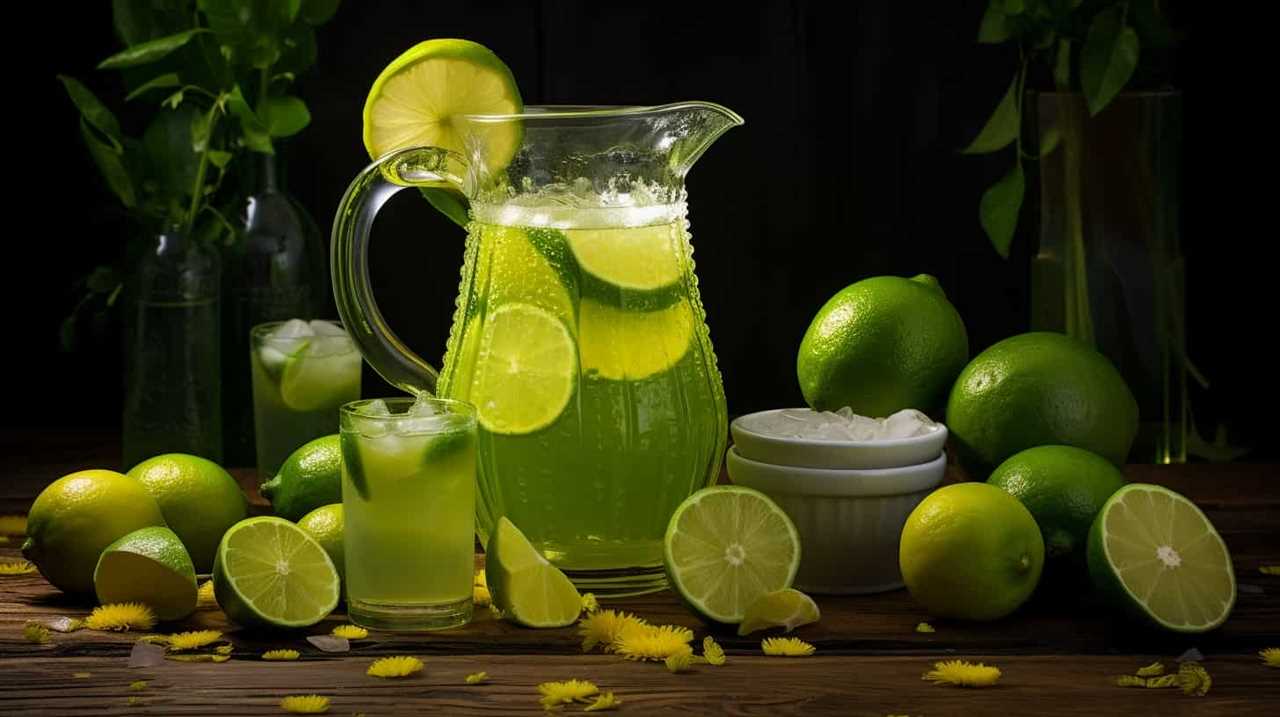
To prevent mold growth, it’s important to follow these steps:
- Store orange juice in the refrigerator at a temperature below 40°F (4°C).
- Check the expiration date on the bottle before consuming. Discard any orange juice that has expired.
- Keep the container tightly sealed to prevent air and moisture from entering, as these can promote mold growth.
Regularly inspecting orange juice for any signs of mold or unusual growth is essential. If you notice any discoloration, a strange odor, or visible mold, it’s best to discard the juice to avoid any potential health risks.
Frequently Asked Questions
Can Orange Juice Go Bad if It’s Stored in the Freezer for Too Long?
Frozen orange juice can potentially lose its nutrients and change its taste if stored in the freezer for too long. It is important to check for signs of spoilage before consuming it.
How Long Can Orange Juice Stay Fresh in the Refrigerator Once It’s Opened?
Once opened, orange juice can stay fresh in the refrigerator for about 7-10 days. To maintain its freshness, store it properly by keeping it tightly sealed and at a consistently cold temperature.
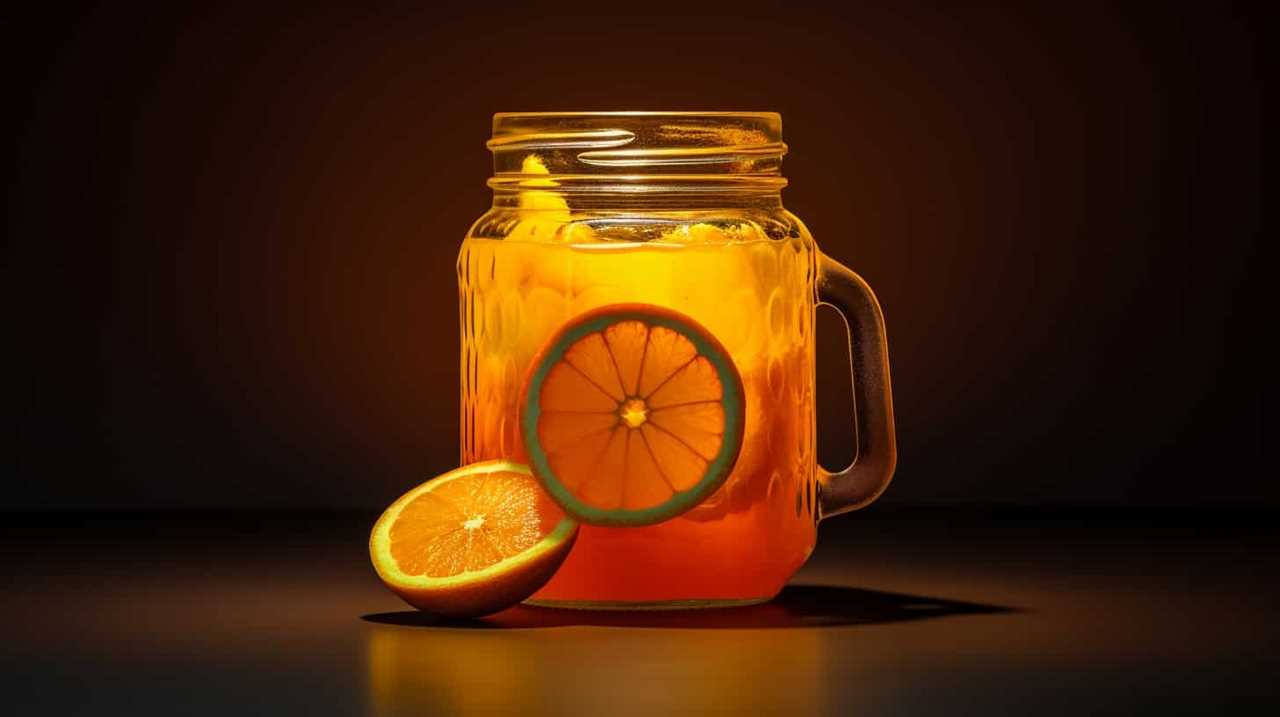
Is It Safe to Consume Orange Juice That Has Been Left Out at Room Temperature Overnight?
Left out orange juice may not be safe to drink as it can harbor harmful bacteria. Signs of spoiled orange juice include a sour smell, mold growth, and a change in color or taste.
Can Orange Juice Develop Harmful Bacteria if It’s Past Its Expiration Date but Still Looks and Smells Fine?
Orange juice can cause food poisoning if it develops harmful bacteria, even if it looks and smells fine. Signs of spoiled orange juice include a sour smell, mold growth, and a change in color or taste.
Does the Nutritional Value of Orange Juice Decrease as It Starts to Go Bad?
As orange juice goes bad, its nutritional value decreases. The longer it sits on the shelf, the more nutrients it loses. Signs of spoilage include a sour smell, off taste, and mold growth.
Conclusion
In conclusion, determining if orange juice is bad requires careful observation of color changes, strange smells, off taste, and texture changes. Just like a detective investigating a case, we must rely on our senses to detect any signs of spoilage.
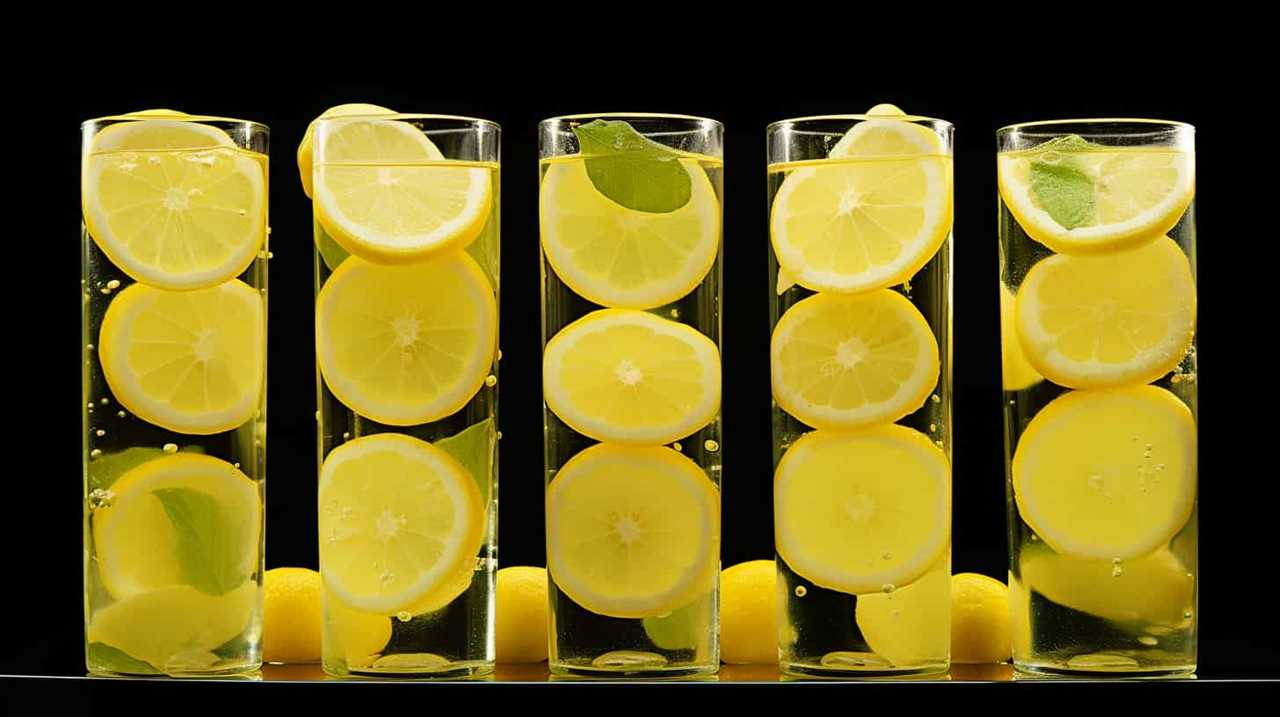
If we detect mold or growth in the orange juice, it’s a clear indication that it’s no longer safe to consume. By remaining vigilant and attuned to these indicators, we can ensure that our orange juice is always fresh and enjoyable.
Susannah expertise lies in researching and compiling evidence-based content on juicing, nutrition, and overall health. She is committed to ensuring that The Juicery World offers accurate, up-to-date, and trustworthy information to empower readers to take control of their health. Susannah’s goal is to inspire individuals to embrace juicing as a way to nourish their bodies and live their best lives.
-

 Juice Tips and Tricks3 months ago
Juice Tips and Tricks3 months agoHow Much Lemon Juice Is Equal To Half A Lemon
-

 Juice Tips and Tricks3 months ago
Juice Tips and Tricks3 months agoHow Much Lemon Juice Concentrate Equals One Lemon
-

 Juice Tips and Tricks3 months ago
Juice Tips and Tricks3 months agoHow Long Can You Drink Orange Juice After The Expiration Date
-

 Fruit Juice Varieties2 months ago
Fruit Juice Varieties2 months agoTop 11 Most Loved Fruit Juice Varieties
-

 Juice Tips and Tricks3 months ago
Juice Tips and Tricks3 months agoHow Much Lemon Juice Is Equivalent To 1 Lemon
-

 Organic and Natural Juices2 months ago
Organic and Natural Juices2 months ago8 Best Organic Brands for Fruit Juice
-

 Juice Tips and Tricks3 months ago
Juice Tips and Tricks3 months agoHow Much Lemon Juice Is Equivalent To One Lemon
-

 Juice Tips and Tricks3 months ago
Juice Tips and Tricks3 months agoHow Long Do You Need To Drink Pineapple Juice Before Oral






